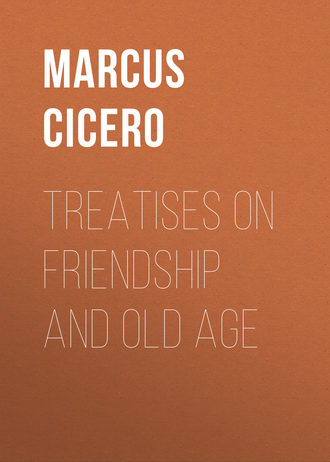 полная версия
полная версияTreatises on Friendship and Old Age
14. Let me repeat then, "the clear indication of virtue, to which a mind of like character is naturally attracted, is the beginning of friendship." When that is the case the rise of affection is a necessity. For what can be more irrational than to take delight in many objects incapable of response, such as office, fame, splendid buildings, and personal decoration, and yet to take little or none in a sentient being endowed with virtue, which has the faculty of loving or, if I may use the expression, loving back? For nothing is really more delightful than a return of affection, and the mutual interchange of kind feeling and good offices. And if we add, as we may fairly do, that nothing so powerfully attracts and draws one thing to itself as likeness does to friendship, it wilt at once be admitted to be true that the good love the good and attach them to themselves as though they were united by blood and nature. For nothing can be more eager, or rather greedy, for what is like itself than nature. So, my dear Fannius and Scaevola, we may look upon this as an established fact, that between good men there is, as it were of necessity, a kindly feeling, which is the source of friendship ordained by nature. But this same kindliness affects the many also. For that is no unsympathetic or selfish or exclusive virtue, which protects even whole nations and consults their best interests. And that certainly it would not have done had it disdained all affection for the common herd.
Again, the believers in the "interest" theory appear to me to destroy the most attractive link in the chain of friendship. For it is not so much what one gets by a friend that gives one pleasure, as the warmth of his feeling; and we only care for a friend's service if it has been prompted by affection. And so far from its being true that lack of means is a motive for seeking friendship, it is usually those who being most richly endowed with wealth and means, and above all with virtue (which, after all, is a man's best support), are least in need of another, that are most openhanded and beneficent. Indeed I am inclined to think that friends ought at times to be in want of something. For instance, what scope would my affections have had if Scipio had never wanted my advice or co-operation at home or abroad? It is not friendship, then, that follows material advantage, but material advantage friendship.
15. We must not therefore listen to these superfine gentlemen when they talk of friendship, which they know neither in theory nor in practice. For who, in heaven's name, would choose a life of the greatest wealth and abundance on condition of neither loving or being beloved by any creature? That is the sort of life tyrants endure. They, of course, can count on no fidelity, no affection, no security for the goodwill of any one. For them all is suspicion and anxiety; for them there is no possibility of friendship. Who can love one whom he fears, or by whom he knows that he is feared? Yet such men have a show of friendship offered them, but it is only a fair-weather show. If it ever happen that they fall, as it generally does, they will at once understand how friendless they are. So they say Tarquin observed in his exile that he never knew which of his friends were real and which sham, until he had ceased to be able to repay either. Though what surprises me is that a man of his proud and overbearing character should have a friend at all. And as it was his character that prevented his having genuine friends, so it often happens in the case of men of unusually great means—their very wealth forbids faithful friendships. For not only is Fortune blind herself; but she generally makes those blind also who enjoy her favours. They are carried, so to speak, beyond themselves with self-conceit and self-will; nor can anything be more perfectly intolerable than a successful fool. You may often see it. Men who before had pleasant manners enough undergo a complete change on attaining power of office. They despise their old friends: devote themselves to new.
Now, can anything be more foolish than that men who have all the opportunities which prosperity, wealth, and great means can bestow, should secure all else which money can buy—horses, servants, splendid upholstering, and costly plate—but do not secure friends, who are, if I may use the expression, the most valuable and beautiful furniture of life? And yet, when they acquire the former, they know not who will enjoy them, nor for whom they may be taking all this trouble; for they will one and all eventually belong to the strongest: while each man has a stable and inalienable ownership in his friendships. And even if those possessions, which are, in a manner, the gifts of fortune, do prove permanent, life can never be anything but joyless which is without the consolations and companionship of friends.
16. To turn to another branch of our subject. We must now endeavour to ascertain what limits are to be observed in friendship—what is the boundary-line, so to speak, beyond which our affection is not to go. On this point I notice three opinions, with none of which I agree. One is that we should love our friend just as much as we love ourselves, and no more; another, that our affection to them should exactly correspond and equal theirs to us; a third, that a man should be valued at exactly the same rate as he values himself. To not one of these opinions do I assent. The first, which holds that our regard for ourselves is to be the measure of our regard for our friend, is not true; for how many things there are which we would never have done for our own sakes, but do for the sake of a friend! We submit to make requests from unworthy people, to descend even to supplication; to be sharper in invective, more violent in attack. Such actions are nut creditable in our own interests, but highly so in those of our friends. There are many advantages too which men of upright character voluntarily forego, or of which they are content to be deprived, that their friends may enjoy them rather than themselves.
The second doctrine is that which limits friendship to an exact equality in mutual good offices and good feelings. But such a view reduces friendship to a question of figures in a spirit far too narrow and illiberal, as though the object were to have an exact balance in a debtor and creditor account. True friendship appears to me to be something richer and more generous than that comes to; and not to be so narrowly on its guard against giving more than it receives. In such a matter we must not be always afraid of something being wasted or running over in our measure, or of more than is justly due being devoted to our friendship.
But the last limit proposed is the worst, namely, that a friend's estimate of himself is to be the measure of our estimate of him. It often happens that a man has too humble an idea of himself, or takes too despairing a view of his chance of bettering his fortune. In such a case a friend ought not to take the view of him which he takes of himself. Rather he should do all he can to raise his drooping spirits, and lead him to more cheerful hopes and thoughts.
We must then find some other limit. But I must first mention the sentiment which used to call forth Scipio's severest criticism. He often said that no one ever gave utterance to anything more diametrically opposed to the spirit of friendship than the author of the dictum, "You should love your friend with the consciousness that you may one day hate him." He could not be induced to believe that it was rightfully attributed to Bias, who was counted as one of the Seven Sages. It was the sentiment of some person with sinister motives or selfish ambition, or who regarded everything as it affected his own supremacy. How can a man be friends with another, if he thinks it possible that he may be his enemy? Why, it will follow that he must wish and desire his friend to commit as many mistakes as possible, that he may have all the more handles against him; and, conversely, that he must be annoyed, irritated, and jealous at the right actions or good fortune of his friends. This maxim, then, let it be whose it will, is the utter destruction of friendship. The true rule is to take such care in the selection of our friends as never to enter upon a friendship with a man whom we could under any circumstances come to hate. And even if we are unlucky in our choice, we must put up with it—according to Scipio—in preference to making calculations as to a future breach.
17. The real limit to be observed in friendship is this: the characters of two friends must be stainless. There must be complete harmony of interests, purpose, and aims, without exception. Then if the case arises of a friend's wish (not strictly right in itself) calling for support in a matter involving his life or reputation, we must make some concession from the straight path—on condition, that is to say, that extreme disgrace is not the consequence. Something must be conceded to friendship. And yet we must not be entirely careless of our reputation, nor regard the good opinion of our fellow-citizens as a weapon which we can afford to despise in conducting the business of our life, however lowering it may be to tout for it by flattery and smooth words. We must by no means abjure virtue, which secures us affection.
But to return again to Scipio, the sole author of the discourse on friendship. He used to complain that there was nothing on which men bestowed so little pains: that every one could tell exactly how many goats or sheep he had, but not how many friends; and while they took pains in procuring the former, they were utterly careless in selecting friends, and possessed no particular marks, so to speak, or tokens by which they might judge of their suitability for friendship. Now the qualities we ought to look out for in making our selection are firmness, stability, constancy. There is a plentiful lack of men so endowed, and it is difficult to form a judgment without testing. Now this testing can only be made during the actual existence of the friend-ship; for friendship so often precedes the formation of a judgment, and makes a previous test impossible. If we are prudent then, we shall rein in our impulse to affection as we do chariot horses. We make a preliminary trial of horses. So we should of friendship; and should test our friends' characters by a kind of tentative friendship. It may often happen that the untrustworthiness of certain men is completely displayed in a small money matter; others who are proof against a small sum are detected if it be large. But even if some are found who think it mean to prefer money to friendship, where shall we look for those who put friendship before office, civil or military promotions, and political power, and who, when the choice lies between these things on the one side and the claims of friendship on the other, do not give a strong preference to the former? It is not in human nature to be indifferent to political power; and if the price men have to pay for it is the sacrifice of friendship, they think their treason will be thrown into the shade by the magnitude of the reward. This is why true friendship is very difficult to find among those who engage in politics and the contest for office. Where can you find the man to prefer his friend's advancement to his own? And to say nothing of that, think how grievous and almost intolerable it is to most men to share political disaster. You will scarcely find anyone who can bring himself to do that. And though what Ennius says is quite true,—" the hour of need shews the friend indeed,"—yet it is in these two ways that most people betray their untrustworthiness and inconstancy, by looking down on friends when they are themselves prosperous, or deserting them in their distress. A man, then, who has shewn a firm, unshaken, and unvarying friendship in both these contingencies we must reckon as one of a class the rarest in the world, and all but superhuman.
18. Now, what is the quality to look out for as a warrant for the stability and permanence of friendship? It is loyalty. Nothing that lacks this can be stable. We should also in making our selection look out for simplicity, a social disposition, and a sympathetic nature, moved by what moves us. These all contribute to maintain loyalty. You can never trust a character which is intricate and tortuous. Nor, indeed, is it possible for one to be trustworthy and firm who is unsympathetic by nature and unmoved by what affects ourselves. We may add, that he must neither take pleasure in bringing accusations against us himself, nor believe them when they are brought. All these contribute to form that constancy which I have been endeavouring to describe. And the result is, what I started by saying, that friendship is only possible between good men.
Now there are two characteristic features in his treatment of his friends that a good (which may be regarded as equivalent to a wise) man will always display. First, he will be entirely without any make-believe or pretence of feeling; for the open display even of dislike is more becoming to an ingenuous character than a studied concealment of sentiment. Secondly, he will not only reject all accusations brought against his friend by another, but he will not be suspicious himself either, nor be always thinking that his friend has acted improperly. Besides this, there should be a certain pleasantness in word and manner which adds no little flavour to friendship. A gloomy temper and unvarying gravity may be very impressive; but friendship should be a little less unbending, more indulgent and gracious, and more inclined to all kinds of good-fellowship and good-nature.
19. But here arises a question of some little difficulty. Are there any occasions on which, assuming their worthiness, we should prefer new to old friends, just as we prefer young to aged horses? The answer admits of no doubt whatever. For there should be no satiety in friendship, as there is in other things. The older the sweeter, as in wines that keep well. And the proverb is a true one, "You must eat many a peck of salt with a man to be thorough friends with him." Novelty, indeed, has its advantage, which we must not despise. There is always hope of fruit, as there is in healthy blades of corn. But age too must have its proper position; and, in fact, the influence of time and habit is very great. To recur to the illustration of the horse which I have just now used. Every one likes ceteris paribus to use the horse to which he has been accustomed, rather than one that is untried and new. And it is not only in the case of a living thing that this rule holds good, but in inanimate things also; for we like places where we have lived the longest, even though they are mountainous and covered with forest. But here is another golden rule in friendship: put yourself on a level with your friend. For it often happens that there are certain superiorities, as for example Scipio's in what I may call our set. Now he never assumed any airs of superiority over Philus, or Rupilius, or Mummius, or over friends of a lower rank stilt. For instance, he always shewed a deference to his brother Quintus Maximus because he was his senior, who, though a man no doubt of eminent character, was by no means his equal. He used also to wish that all his friends should be the better for his support. This is an example we should all follow. If any of us have any advantage in personal character, intellect, or fortune, we should be ready to make our friends sharers and partners in it with ourselves. For instance, if their parents are in humble circumstances, if their relations are powerful neither in intellect nor means, we should supply their deficiencies and promote their rank and dignity. You know the legends of children brought up as servants in ignorance of their parentage and family. When they are recognized and discovered to be the sons of gods or kings, they still retain their affection for the shepherds whom they have for many years looked upon as their parents. Much more ought this to be so in the case of real and undoubted parents. For the advantages of genius and virtue, and in short, of every kind of superiority, are never realized to their fullest extent until they are bestowed upon our nearest and dearest.
20. But the converse must also be observed. For in friendship and relationship, just as those who possess any superiority must put themselves on an equal footing with those who are less fortunate, so these latter must not be annoyed at being surpassed in genius, fortune, or rank. But most people of that sort are forever either grumbling at something, or harping on their claims; and especially if they consider that they have services of their own to allege involving zeal and friendship and some trouble to themselves. People who are always bringing up their services are a nuisance. The recipient ought to remember them; the performer should never mention them. In the case of friends, then, as the superior are bound to descend, so are they bound in a certain sense to raise those below them. For there are people who make their friendship disagreeable by imagining themselves undervalued. This generally happens only to those who think that they deserve to be so; and they ought to be shewn by deeds as well as by words the groundlessness of their opinion. Now the measure of your benefits should be in the first place your own power to bestow, and in the second place the capacity to bear them on the part of him on whom you are bestowing affection and help. For, however great your personal prestige may be, you cannot raise all your friends to the highest offices of the State. For instance, Scipio was able to make Publius Rupilius consul, but not his brother Lucius. But granting that you can give anyone anything you choose, you must have a care that it does not prove to be beyond his powers. As a general rule, we must wait to make up our mind about friendships till men's characters and years have arrived at their full strength and development. People must not, for instance, regard as fast friends all whom in their youthful enthusiasm for hunting or football they liked for having the same tastes. By that rule, if it were a mere question of time, no one would have such claims on our affections as nurses and slave-tutors. Not that they are to be neglected, but they stand on a different ground. It is only these mature friendships that can be permanent. For difference of character leads to difference of aims, and the result of such diversity is to estrange friends. The sole reason, for instance, which prevents good men from making friends with bad, or bad with good, is that the divergence of their characters and aims is the greatest possible.
Another good rule in friendship is this: do not let an excessive affection hinder the highest interests of your friends. This very often happens. I will go again to the region of fable for an instance. Neoptolemus could never have taken Troy if he had been willing to listen to Lycomedes, who had brought him up, and with many tears tried to prevent his going there. Again, it often happens that important business makes it necessary to part from friends: the man who tries to baulk it, because he thinks that he cannot endure the separation, is of a weak and effeminate nature, and on that very account makes but a poor friend. There are, of course, limits to what you ought to expect from a friend and to what you should allow him to demand of you. And these you must take into calculation in every case.
21. Again, there is such a disaster, so to speak, as having to break off friendship. And sometimes it is one we cannot avoid. For at this point the stream of our discourse is leaving the intimacies of the wise and touching on the friendship of ordinary people. It will happen at times that an outbreak of vicious conduct affects either a man's friends themselves or strangers, yet the discredit falls on the friends. In such cases friendships should be allowed to die out gradually by an intermission of intercourse. They should, as I have been told that Cato used to say, rather be unstitched than toni in twain; unless, indeed, the injurious conduct be of so violent and outrageous a nature as to make an instant breach and separation the only possible course consistent with honour and rectitude. Again, if a change in character and aim takes place, as often happens, or if party politics produces an alienation of feeling (I am now speaking, as I said a short time ago, of ordinary friendships, not of those of the wise), we shall have to be on our guard against appearing to embark upon active enmity while we only mean to resign a friendship. For there can be nothing more discreditable than to be at open war with a man with whom you have been intimate. Scipio, as you are aware, had abandoned his friendship for Quintus Pompeius on my account; and again, from differences of opinion in politics, he became estranged from my colleague Metellus. In both cases he acted with dignity and moderation, shewing that he was offended indeed, but without Tancour.
Our first object, then, should be to prevent a breach; our second, to secure that, if it does occur, our friendship should seem to have died a natural rather than a violent death. Next, we should take care that friendship is not converted into active hostility, from which flow personal quarrels, abusive language, and angry recriminations. These last, however, provided that they do not pass all reasonable limits of forbearance, we ought to put up with, and, in compliment to an old friendship, allow the party that inflicts the injury, not the one that submits to it, to be in the wrong. Generally speaking, there is but one way of securing and providing oneself against faults and inconveniences of this sort—not to be too hasty in bestowing our affection, and not to bestow it at all on unworthy objects.
Now, by "worthy of friendship" I mean those who have in themselves the qualities which attract affection. This sort of man is rare; and indeed all excellent things are rare; and nothing in the world is so hard to find as a thing entirely and completely perfect of its kind. But most people not only recognize nothing as good in our life unless it is profitable, but look upon friends as so much stock, caring most for those by whom they hope to make most profit. Accordingly they never possess that most beautiful and most spontaneous friendship which must be sought solely for itself without any ulterior object. They fail also to learn from their own feelings the nature and the strength of friendship. For every one loves himself, not for any reward which such love may bring, but because he is dear to himself independently of anything else. But unless this feeling is transferred to another, what a real friend is will never be revealed; for he is, as it were, a second self. But if we find these two instincts shewing themselves in animals,—whether of the air or the sea or the land, whether wild or tame,—first, a love of self, which in fact is born in everything that lives alike; and, secondly, an eagerness to find and attach themselves to other creatures of their own kind; and if this natural action is accompanied by desire and by something resembling human love, how much more must this be the case in man by the law of his nature? For man not only loves himself, but seeks another whose spirit he may so blend with his own as almost to make one being of two.
22. But most people unreasonably, not to speak of modesty, want such a friend as they are unable to be themselves, and expect from their friends what they do not themselves give. The fair course is first to be good yourself, and then to look out for another of like character. It is between such that the stability in friendship of which we have been talking can be secured; when, that is to say, men who are united by affection learn, first of all, to rule those passions which enslave others, and in the next place to take delight in fair and equitable conduct, to bear each other's burdens, never to ask each other for anything inconsistent with virtue and rectitude, and not only to serve and love but also to respect each other. I say "respect"; for if respect is gone, friendship has lost its brightest jewel. And this shows the mistake of those who imagine that friendship gives a privilege to licentiousness and sin. Nature has given us friendship as the handmaid of virtue, not as a partner in guilt: to the end that virtue, being powerless when isolated to reach the highest objects, might succeed in doing so in union and partnership with another. Those who enjoy in the present, or have enjoyed in the past, or are destined to enjoy in the future such a partnership as this, must be considered to have secured the most excellent and auspicious combination for reaching nature's highest good. This is the partnership, I say, which combines moral rectitude, fame, peace of mind, serenity: all that men think desirable because with them life is happy, but without them cannot be so. This being our best and highest object, we must, if we desire to attain it, devote ourselves to virtue; for without virtue we can obtain neither friendship nor anything else desirable. In fact, if virtue be neglected, those who imagine themselves to possess friends will find out their error as soon as some grave disaster forces them to make trial of them. Wherefore, I must again and again repeat, you must satisfy your judgment before engaging your affections: not love first and judge afterwards. We suffer from carelessness in many of our undertakings: in none more than in selecting and cultivating our friends. We put the cart before the horse, and shut the stable door when the steed is stolen, in defiance of the old proverb. For, having mutually involved ourselves in a long-standing intimacy or by actual obligations, all on a sudden some cause of offence arises and we break off our friendships in full career.









